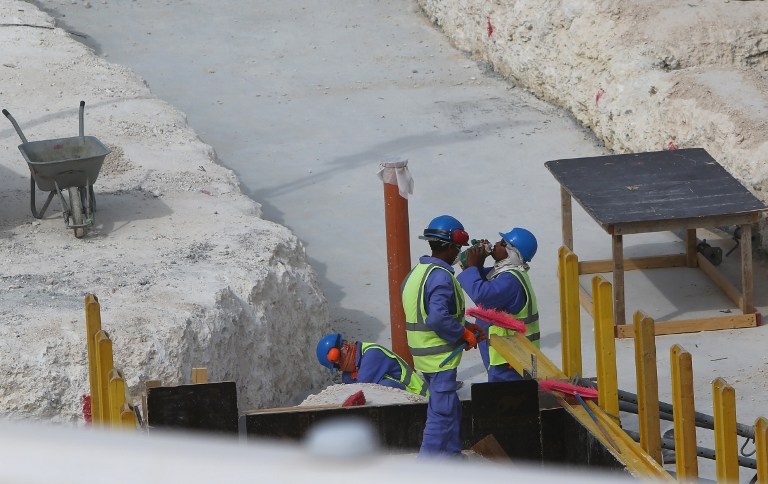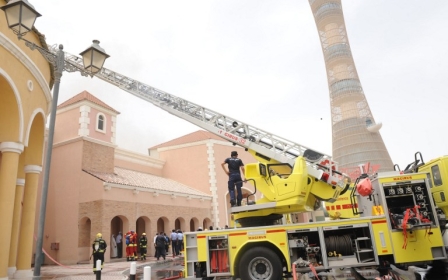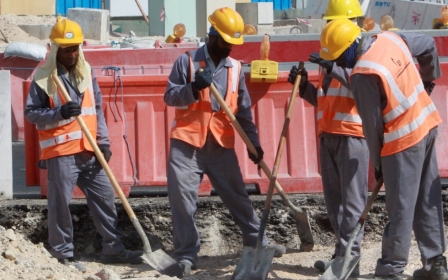Qatar slammed by rights groups over 'cosmetic' labour reforms

Rights groups on Wednesday dismissed as a "sham" long-awaited reforms of Qatar's much-criticised "kafala" labour system for foreign workers, which critics have likened to modern-day slavery.
Qatar's emir, Sheikh Tamim bin Hamad al-Thani, on Tuesday approved a new law introducing changes to the sponsorship system, which currently only allows workers to leave the country with the approval of their employer, as well as rules that allow workers to switch jobs.
But activists said the changes were unlikely to make any real difference for the thousands of foreign workers in the gas-rich Gulf state, many of whom are preparing facilities for Qatar's hosting of football's 2022 World Cup.
Qatar pledged to improve conditions for workers following stories last year about the deaths of hundreds of workers, many from countries such as Nepal, Bangladesh, India and Sri Lanka, on the country's construction sites.
Aidan McQuade, director of the campaign group Anti-Slavery International, branded the changes to the system as "merely cosmetic" and said they did not go far enough to prevent vulnerable workers from being "legally enslaved".
"With around 1,000 workers dying every year it remains an imperative for [world football governing body] FIFA and its sponsors to use their power to bring an end to this carnage by demanding meaningful reform, including an end to Kafalah and freedom of association for workers, as a price for Qatar retaining the World Cup,” he said.
“As it stands the 2022 World Cup in Qatar is still on track to be the world's bloodiest sporting event since Julius Caesar's funeral games."
Sharan Burrow, general secretary of the International Trade Union Confederation, one of Qatar's fiercest critics, said the latest changes were little more than "sham reforms".
"The new labour law does not abolish the notorious exit permits, and workers still have to get their employers' permission to leave the country," she said.
The new rules require foreign workers wishing to leave Qatar to apply for permission from the interior ministry at least 72 hours beforehand.
Officials will then check with employers and if permission is denied, workers can complain to a grievance committee that will be established under the new law.
Notably, Qatar has removed the word "sponsor" from the proposed changes.
The changes also allow foreign workers to switch jobs at the end of a fixed-term contract, usually five years.
Under the current system, workers who leave a job at the end of a contract have to wait two years to return to Qatar to take up a new position, if the employer objects to the new job.
Some businesses have lobbied for retention of the restrictions as they feared loosening of the sponsorship system would lead to them losing key staff during the duration of major infrastructure projects.
Members of a Qatar business chamber argued earlier this year for fixed contracts to be extended to 10 years so that staff would not leave, according to local media.
"These changes are unlikely to lead to a meaningful improvement," Nicholas McGeehan, Gulf researcher at Human Rights Watch, told the AFP news agency.
"One of the most disappointing aspects of the law is the fact that workers will still apparently need employer permission to leave the country," he said.
Amnesty International's Mustafa Qadri told AFP an opportunity had been "lost".
"What we have seen so far is really inadequate. We welcome the fact that there's an attempt at reform but we need to see more," he said.
"There's still time for Qatar to take further steps to address its problems and not expect that because of this announcement the pressure is off."
Exiting the country and changing employment had proved the trickiest areas to change and were the subject of fierce debate within Qatar, with the country's main advisory body, the Shura Council, questioning reforms earlier this summer.
It was not clear exactly when the changes would take effect, but it was unlikely to be before 2017 at the earliest.
Qatar has faced fierce criticism from rights groups for its slow pace of reform, even though the country announced earlier this year that it was committed to change the "kafala" system by the end of 2015.
The system applies to some 1.8 million foreign workers, who make up about 90 per cent of the population in the tiny Gulf state.
The number of foreign workers, many of them labourers on major infrastructure projects directly or indirectly related to the World Cup, is expected to reach 2.5 million by 2020.
New MEE newsletter: Jerusalem Dispatch
Sign up to get the latest insights and analysis on Israel-Palestine, alongside Turkey Unpacked and other MEE newsletters
Middle East Eye delivers independent and unrivalled coverage and analysis of the Middle East, North Africa and beyond. To learn more about republishing this content and the associated fees, please fill out this form. More about MEE can be found here.




